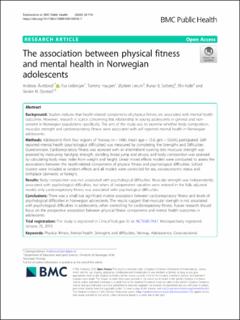| dc.contributor.author | Åvitsland, Andreas | |
| dc.contributor.author | Leibinger, Eva | |
| dc.contributor.author | Haugen, Tommy | |
| dc.contributor.author | Kolle, Elin | |
| dc.contributor.author | Lerum, Øystein | |
| dc.contributor.author | Solberg, Runar Barstad | |
| dc.contributor.author | Dyrstad, Sindre Mikal | |
| dc.date.accessioned | 2020-06-24T11:08:44Z | |
| dc.date.available | 2020-06-24T11:08:44Z | |
| dc.date.created | 2020-05-27T10:58:24Z | |
| dc.date.issued | 2020-05 | |
| dc.identifier.citation | Åvitsland, A., Leibinger, E., Haugen, T. et al. (2020) The association between physical fitness and mental health in Norwegian adolescents. BMC Public Health, 20 | en_US |
| dc.identifier.issn | 1471-2458 | |
| dc.identifier.uri | https://hdl.handle.net/11250/2659294 | |
| dc.description.abstract | Background
Studies indicate that health-related components of physical fitness are associated with mental health outcomes. However, research is scarce concerning this relationship in young adolescents in general and non-existent in Norwegian populations specifically. The aim of the study was to examine whether body composition, muscular strength and cardiorespiratory fitness were associated with self-reported mental health in Norwegian adolescents.
Methods
Adolescents from four regions of Norway (n = 1486; mean age = 13.9; girls = 50.6%) participated. Self-reported mental health (psychological difficulties) was measured by completing the Strengths and Difficulties Questionnaire. Cardiorespiratory fitness was assessed with an intermittent running test; muscular strength was assessed by measuring handgrip strength, standing broad jump and sit-ups; and body composition was assessed by calculating body mass index from weight and height. Linear mixed effects models were conducted to assess the associations between the health-related components of physical fitness and psychological difficulties. School clusters were included as random effects and all models were controlled for sex, socioeconomic status and birthplace (domestic or foreign).
Results
Body composition was not associated with psychological difficulties. Muscular strength was independently associated with psychological difficulties, but when all independent variables were entered in the fully adjusted model, only cardiorespiratory fitness was associated with psychological difficulties.
Conclusions
There was a small but significant inverse association between cardiorespiratory fitness and levels of psychological difficulties in Norwegian adolescents. The results suggest that muscular strength is not associated with psychological difficulties in adolescents, when controlling for cardiorespiratory fitness. Future research should focus on the prospective association between physical fitness components and mental health outcomes in adolescents. | en_US |
| dc.language.iso | eng | en_US |
| dc.publisher | BioMed Central | en_US |
| dc.rights | Navngivelse 4.0 Internasjonal | * |
| dc.rights.uri | http://creativecommons.org/licenses/by/4.0/deed.no | * |
| dc.subject | helse | en_US |
| dc.subject | mental helse | en_US |
| dc.subject | fysisk form | en_US |
| dc.subject | ungdommer | en_US |
| dc.title | The association between physical fitness and mental health in Norwegian adolescents | en_US |
| dc.type | Peer reviewed | en_US |
| dc.type | Journal article | en_US |
| dc.description.version | publishedVersion | en_US |
| dc.rights.holder | © The Author(s) 2020 | en_US |
| dc.subject.nsi | VDP::Medisinske Fag: 700::Helsefag: 800::Samfunnsmedisin, sosialmedisin: 801 | en_US |
| dc.source.volume | 20 | en_US |
| dc.source.journal | BMC Public Health | en_US |
| dc.source.issue | 1 | en_US |
| dc.identifier.doi | https://doi.org/10.1186/s12889-020-08936-7 | |
| dc.identifier.cristin | 1812775 | |
| cristin.ispublished | true | |
| cristin.fulltext | original | |
| cristin.qualitycode | 1 | |

